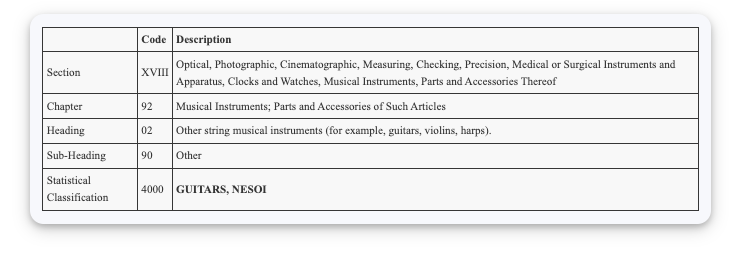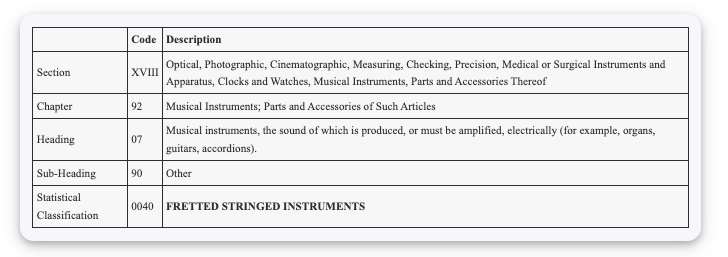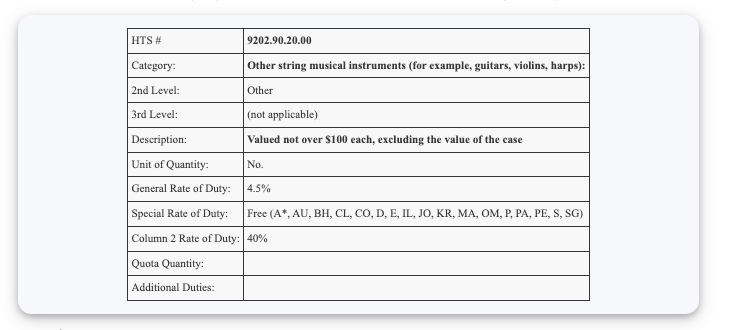Support Home > Import & Export Shipping >
Can I ship guitars from the US to Canada or Canada to the US?
Absolutely! But (yes, there’s a ‘but”) there’s more information you will need to know before you print the label with our discounted shipping rates, and ship your package on it’s way!
Depending on what type of guitar you’re shipping, and where the pick-up and destination are you may need to know the freight classification and any import or export related shipping codes for shipping guitars. There is also additional information about packaging and customs (forms) that are very important to understand to ensure fast shipping and safe arrival with minimal delays.
Shipping Guitars 101: The Basics
The value and type of guitar you’re shipping determines its respective HS code. United States export codes, more commonly known as “Schedule-B numbers” are based on the [international] Harmonized System and further classify the items you’re shipping. These codes can also be used to get tariff schedules for the guitar.
The type and value of the guitar also determines the statistical classification for the Schedule-B Number.
Below you can see the way a Schedule-B Number is found, with the number for a guitar valued under $100 being 9202902000

Below is what it looks like for guitars valued over $100 resulting in a code of: 9202904000

and below is what it looks like for guitars requiring electricity resulting in a code of: 9207900040

You can then use the Schedule-B Number from the table to find the Harmonized Tariff Schedule. Do keep in mind that these values can change periodically, so make sure to check the links above for updated information!

You can find more in-depth information by checking out the Freight Classes and Shipping Codes section of Support Central.
If you’re worried about damages to the guitar you’re shipping, a helpful guide on how the insurance works through ShipNerd, has all the notes you need to pluck through.
Does the guitar contain inlaid wood or other animal material like mother of pearl?
Shipping to the United States
When exporting guitars to the United States, it’s essential to include several required documents uploaded electronically with your shipment. Missing or incomplete documentation may result in delays or the shipment being returned to the sender.
USMCA-CUSMA: If your guitar was manufactured in Canada, the United States, or Mexico, a Certificate of Origin is required for your shipment. This document is also used to qualify for duty and tariff relief when entering the United States.
Learn more about the USMCA.
Toxic Substances Control Act (TSCA): Most guitars imported into the United States require a TSCA certification. In most cases, this will be a negative certification, confirming that the guitar does not contain regulated toxic substances. This requirement exists because of the finishes, wood treatments, and paints commonly used in guitar manufacturing.
Learn more about the TSCA
Lacey Act: All guitars made from or containing wood must include a Lacey Act Declaration. This form specifies the types of wood used in the instrument and ensures compliance with U.S. environmental regulations.
Learn more about the Lacey Act
Things to Remember
Guitars can be susceptible to environmental damage from humidity. Special handling can make sure your instrument gets to the customer in the same condition you sent it. Make sure to keep this in mind when shipping your guitar (acoustic or electric) with couriers such as UPS or Canpar Express.
Use the shipping quick quote tool to see the best shipping rates for your guitar. Remember, package couriers only accept packages weighing up to 150 lbs, and up to 165” in length and girth combined. If you’re shipping multiple guitars consider shipping via LTL to save on shipping costs.
Be sure to pack your guitars properly when shipping to avoid damages! We’ve created a How to package a guitar for shipping DIY to help new musical ShipNerds learn the packaging strings.
LTL Freight Shipments for Guitars
Shipments over the above restrictions, or shipments containing multiple guitars, will ship via LTL Freight which has its own caveats. It’s important to properly pack and wrap your pallet to ensure your items are safe. You should also make sure you’re using a quality pallet that is sturdy and reliable. For more information on how to properly package a pallet go here.
There is also different information for insurance when it comes to LTL Freight. Insurance for LTL/Freight shipments can be purchased at a discounted rate in increments of $100 to a maximum of $25,000.00 per shipment giving both you, and your customer, peace of mind.
The National Motor Freight Classification (NMFC) for both acoustic and electric guitars is 139000 and they have a freight class of 200 and is important when shipping guitars via LTL/palletized methods.
No matter what kind of instrument you’re shipping, the ShipNerd team can get you discounted rates and tailored support for your business no matter how small or large. With 0 commitments, choosing us to ship your guitar is just the right note to play!